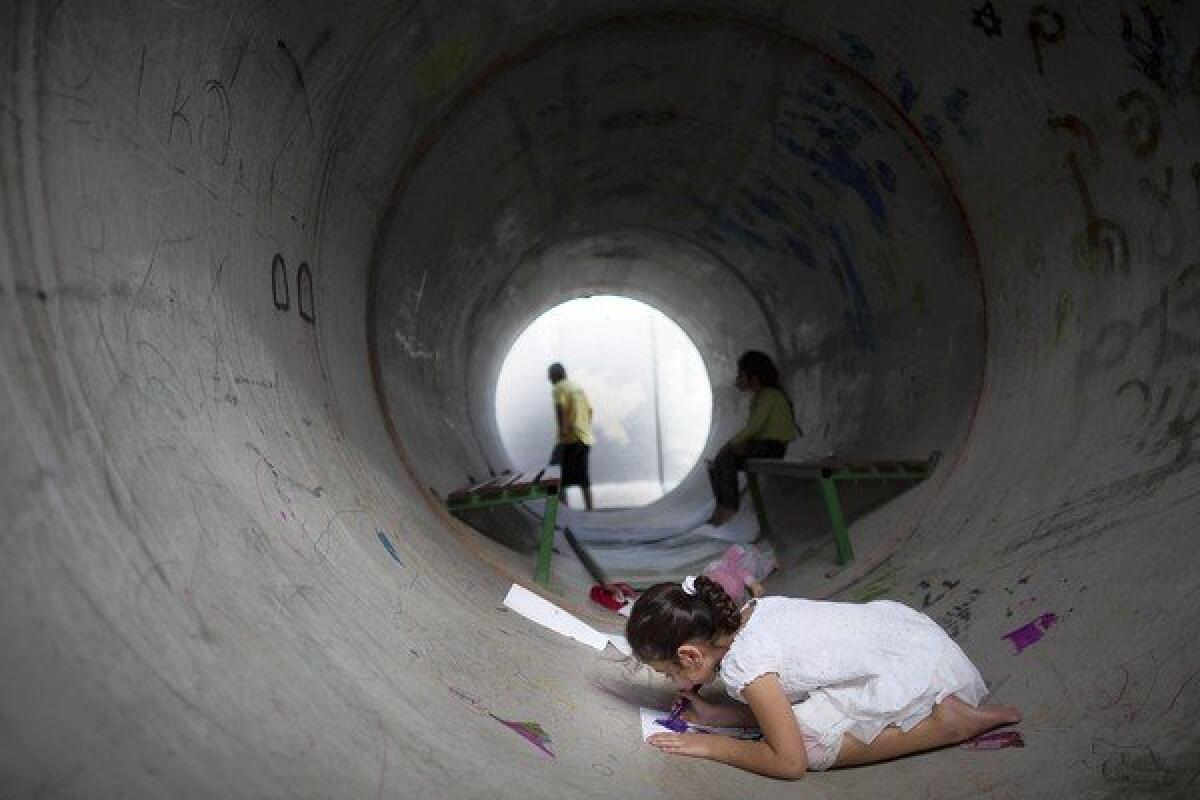In crisis, Israel keeps a shtick upper lip

- Share via
RISHON LE ZION, Israel — During the recent conflict between Israel and Hamas, high-tech executive Sharon Savariego was never far from the essentials: easy access to the family bomb shelter, a television beaming 24/7 emergency coverage and a laptop to check the latest Internet levity.
“The jokes were everywhere,” Savariego said days after the wail of sirens had receded and the rockets had stopped crashing. When “we have these situations, we make humor about everything.”
Israelis are well-known for their cynicism and dark humor, a way to relieve stress, bring people together and provide an illusion of normality during a crisis.
“Where there’s more suffering, there’s more humor,” said Arie Sover, a professor at Ashkelon Academic College and editor of the Israeli Journal of Humor Research. “The history of the Jewish people is filled with bad things, so we have an extraordinary humor system.”
Within minutes of the first hail of rockets from the Gaza Strip in mid-November, jokes were also flying, their payloads aimed at the Palestinian militant group Hamas, Israeli Prime Minister Benjamin Netanyahu, Israel’s Iron Dome anti-missile system, air raid sirens and shelter life.
Mock weather reports read, “Cloudy with a chance of rockets.”
“To those of you moving to Canada, can I have your flat screens?” wrote comedian Benji Lovitt, adding that his apartment was available for those under fire, “especially if you are female, single and between the ages of 29 and 37.”
In a stand-up routine by comedian Yossi Tarablus, students asked Hamas to target their school — and volunteered its GPS coordinates — to avoid a math test.
Making light of danger lets Israelis feel more in control, said comedians and trauma experts. Moreover, almost nothing is off-limits in this often-abrasive culture.
“Part of the humor comes from the macho bravado you need to live in Israel,” said Donna Rosenthal, author of “The Israelis.” “There is no such thing as politically correct, and no such thing as sacred cows.”
Comedy often verbalizes the anxieties that people wouldn’t otherwise express, said Lovitt, including the fear of being caught unprepared.
“When the siren goes off, and you’re in the crapper, you just have to laugh,” he said in a Facebook post that drew dozens of “likes.”
For some, humor provides an antidote to endless political debate.
“It helps tune out all the online shrillness,” said Sarah Tuttle-Singer, social media director for the Times of Israel, an online news site. “Personally, it helped me cope.”
Some jokes juxtaposed religion and science. Among Savariego’s favorites: a picture of the Iron Dome beside a yarmulke — “dome” and “yarmulke” are the same word in Hebrew — with the caption “Which one helped us more?”
Shelter life provided ample fodder, including a routine by Tarablus about meeting his 70-year-old neighbor in the stairwell after she’d run out without her shirt on. “Then I really considered myself a trauma victim,” he said.
Not everyone found it amusing, however.
“It’s not always so funny, because I live it,” said Gila Elcham-Gueta, a small-business owner in Ashkelon.
Predictably, Hamas was a frequent target, particularly after it sent propaganda messages in Hebrew.
“Next time you want to scare people, please use your spell-check,” countered an Israeli video clip. When Israeli forces killed Hamas military leader Ahmed Jabari in an airstrike on his car, a satirical Times of Israel guest blog read, “Hamas chief’s death reveals dangers of driving in Middle East.”
Netanyahu, whose nickname is “Bibi,” came under comic attack after agreeing to a cease-fire some saw as a sellout, with a photo that went viral of soldiers prone on the ground, their bodies spelling, “Bibi’s a loser.”
Comedians provided outreach in southern Israel, where most of the Hamas rockets were aimed, offering free entertainment to boost spirits. “The response was great,” said comedian Odelia Yakir. “People appreciated that we came from the center, risked ourselves, to perform.”
Follow-up shows were canceled when the conflict ended. “Oh well, next war,” said Tarablus.
A few emailed jokes circulated in Gaza and the West Bank as well, Palestinians said, including a picture of Netanyahu beside sewer pipes that poked fun at an Israeli program using them as temporary shelters, and a bit expressing amused disbelief that the latest Palestinian rockets actually worked after years in which they resembled piddling fireworks.
“While Palestinians used to joke a lot about Yasser Arafat, nowadays our leadership is a bit gloomy,” said Islah Jad, a professor at Birzeit University outside Ramallah, in the West Bank. “Now it’s not even worth joking about.”
Although Israeli comics say almost anything is fair game, they do have limits. Many said they avoid joking about kidnapped soldiers or attacks that kill Israelis or children. “Kids are kids on either side, especially if you’re a father,” Tarablus said. “You need to be sensitive.”
A bus bombing in Tel Aviv during the conflict, the first in years, also gave pause, evoking a period of great anguish in the 1990s. Once it became apparent that no one had died, however, humorists revved back up with Facebook posts such as “Getting on a bus, wish me luck” and “We’re going back to the ‘90s, get out your AC/DC albums.”
As the conflict wound down, attention shifted to the next “crisis”: overindulgence during Hanukkah. “Now it’s time to deal with the real threat at hand,” one wag wrote online. “Jelly donuts.”
Batsheva Sobelman of The Times’ Jerusalem bureau and special correspondents Maher Abukhater in the West Bank and Rushdi abu Alouf in Gaza City contributed to this report.
More to Read
Sign up for Essential California
The most important California stories and recommendations in your inbox every morning.
You may occasionally receive promotional content from the Los Angeles Times.












